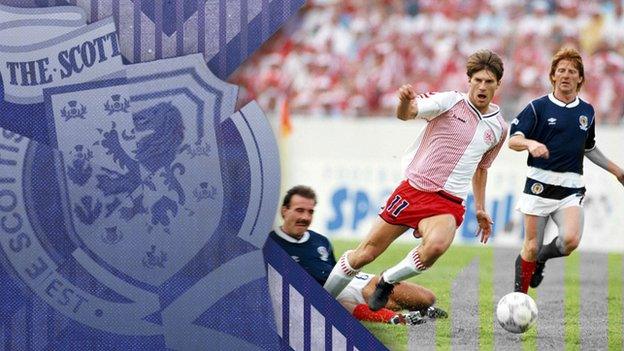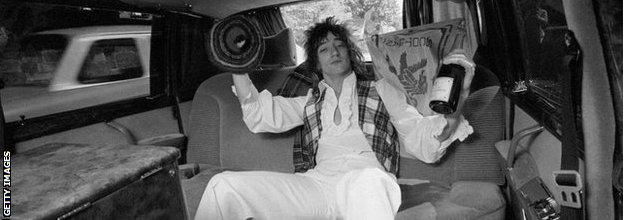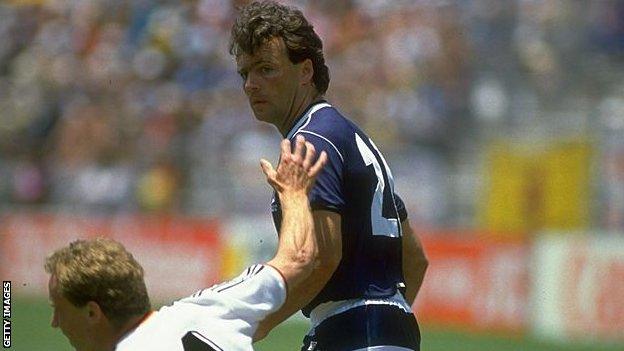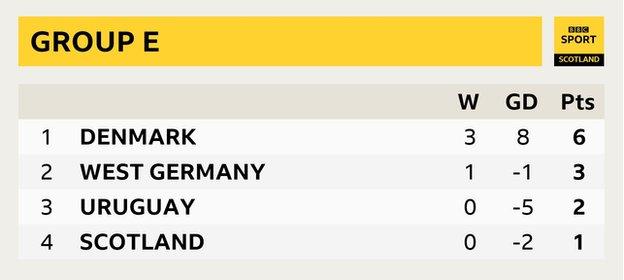Scotland: Dalglish, Souness & Rod Stewart - World Cup '86 remembered
- Published

On a veranda at the Scotland squad hotel, captain Graeme Souness is discussing the players he is trying to sign for Rangers. Manager Alex Ferguson is in his room mulling over interest from Arsenal and Tottenham. And thousands of miles away, Kenny Dalglish - the country's most-capped player - is sitting idle.
To say the national team's Mexico 1986 campaign was infused with intrigue would be doing the dictionary a disservice.
After all, this was a campaign in which the manager died in the dressing room before qualification was clinched. His replacement was the greatest the game has ever seen. Three future national team bosses were on bibs and cones duty. The player-managers of two of Britain's biggest clubs were named in the squad. As, belatedly, was a striker from European Cup finalists Barcelona. And the Scottish FA president almost sparked a diplomatic incident by labelling opponents "scum".
Furthermore, in the build-up you had players drinking mudslingers with Rod Stewart, hanging out of stretch limos on Sunset Boulevard, appearing on Grandstand drunk and - apparently - heckling John McEnroe at the Australian Open.
David Coleman, sunstroke & cheerio Kenny
The latter two incidents took place in Melbourne, scene of the qualification play-off second leg with Australia.
Scotland had set up that tie on a wretched night in Cardiff, their joy stolen by the death of Jock Stein in the immediate aftermath of a 1-1 draw. That left assistant Ferguson to take charge for the play-off, leading the side to a 2-0 aggregate win after a goalless meeting down under.
Goalkeeper Alan Rough remembers "a right good carry on" on the flight home after a four-day trip that included a night out at a Scottish social club, intoxicated striker David Speedie having to be carried back to the hotel for a live BBC interview with David Coleman, and the same player passing out from sunstroke after a putting competition got a little too heated.
Manager Alex Ferguson and his team prepare for World Cup 1986 without Kenny Dalglish
Speedie would be excluded from Ferguson's squad for the finals, but it was the absence of another name that caused controversy. Alan Hansen had won the English double with Liverpool but failed to make the final 22, with the then-Aberdeen manager preferring Pittodrie partnership Willie Miller and Alex McLeish. "I don't think Alan had been playing much," says Miller. "I don't know if conversations were had but it's a long way to go if you're not starting."
Within days, Hansen's close friend and Liverpool player-manager Kenny Dalglish - 35 and preparing for a fourth finals - withdrew with a knee problem. Some said the two events were not unrelated.
'I'll never forget wee Charlie hanging out of that limo'
Dalglish's place would be taken by Barcelona's Steve Archibald as the squad travelled to Santa Fe in New Mexico for an altitude training camp.
Those involved speak fondly of those two weeks, which started with an irate Ferguson demanding the Scottish FA suits vacate their first-class seats on the plane for the players, and ended with an eventful two-day stay in Los Angeles.
Winger Eamonn Bannon recalls scoring twice in a friendly against "Mickey Mouse local team" LA Heat before a reunion with his brother. Others tell conflicting tales about meeting with Rod Stewart...
Miller says his invitation got lost in the post; coach Craig Brown says Ferguson gave the players the night off on the condition they didn't go to a party at the singer's house; Bannon reckons a select group were permitted to show face and were a little worse for wear the next day. But Rough has a more vivid recollection.

Is this the same Rod Stewart limo Charlie Nicholas phoned his mum from?
"It was fantastic," he says. "We never made Rod's house, though. We met him at some restaurant and he started making us mudslingers. Within an hour, we were all half cut and he disappeared. Then a stretch limo turned up to take us home. There was a phone in it and I'll never forget wee Charlie Nicholas hanging out of the sunroof calling his maw in Milton while we were driving down Sunset Boulevard."
Tiny caves & Berti going undercover
After all that, Scotland were the last team to arrive in Mexico and took up residence in the middle of an Aztec heritage site.
Miller describes it as "a wee bit more spartan" than the squad had grown accustomed to, while Bannon remembers a hairy police escort from the airport and "individual rooms that were like little caves with a tiny window".
But the focus was on the opening game with Denmark. They might have been among the best in Europe but the Danes were also adept at the other side of the game, successfully hobbling Nicholas, whose selection with Paul Sturrock caused Archibald to storm out of a team meeting in a huff.
As it was, the Scots were left to rue their profligacy as Preben Elkjaer Larsen's goal gave the Danes victory. "I always thought the first game was the one," says Rough. "You have to take something, especially with West Germany next."
After impressing from the bench, Bannon started against Franz Beckenbauer's side in a game best remembered for Gordon Strachan's attempt to hurdle the hoarding after giving Scotland an early lead.

Davie Cooper in action for Scotland against West Germany
The eventual finalists would ultimately recover to win 2-1 in a game played in the stifling midday sun. Miller describes it as "like playing on a different planet"; Bannon remembers being unable to muster the energy to join the celebrations for Strachan's 18th-minute goal; while third-choice goalkeeper Rough "had the Ambre Solaire on" in the stands.
Archibald had been restored to the XI, with Strachan playing off him. The ploy was designed to deceive the Germans, but it later emerged they had managed to watch a Scotland closed training session.
"Wee Berti Vogts told us he tried to get in but was turned away," recounts Brown of the then Germany assistant and future Scotland boss. "But then he saw a guy going into the stadium to set up a Coca-Cola stall, so he took a shot of his uniform and barrow and rolled it in so he could watch."
'Souness said he was trying to sign Woods & Butcher'
Two defeats in two games left Scotland needing to beat Uruguay to advance to the last 16 and Ferguson with a decision to make.
Captain Souness, by then 33, had struggled with the heat and the altitude and, after a meeting of the coaches, it was agreed he would be left out. The manager went immediately to the midfielder's room to break the news, which was apparently met without fuss.
A couple of months before, it had been announced Souness would be leaving Sampdoria to revolutionise Rangers. A Rangers side that would threaten Ferguson's Aberdeen and a Dundee United side represented in Mexico by five players.
Neither Miller nor Bannon recalls any tensions as a consequence, although the former suggests the dynamic had shifted given more than half the squad were Scotland-based, and the latter recalls whispered conversations between the captain and defender Richard Gough, who would arrive at Ibrox the next summer.
"His room was two doors down from mine and I chatted to him a lot," says Rough. "He told me he was trying to sign Chris Woods and Terry Butcher, who were both in the England squad, and I just laughed. But you could see he was really trying to learn about the Scottish game."
Getting a savaging & being wired for sound
Being confined to the sidelines for the final game with Uruguay would afford Souness further opportunity to do so, with seven domestic-based players in the XI. And they would face just 10 South Americans for almost the whole contest, after Jose Batista was dismissed inside a minute for assaulting Strachan.
Bannon "didn't think wee Gordon was going to get up" after what Miller calls a "savaging", while Rough says such treatment extended to the Uruguay fans, who spat and threw coins at the Scotland bench.
So incensed was Scottish FA president Ernie Walker, that he told the global media that "we found ourselves on the field with cheats and cowards and we were associated with the scum of world football".
None of that changed the fact Ferguson's side were unable to muster the goal that would have put them through. The best chance fell to Liverpool's Steve Nicol, but his effort was clawed clear and the Scots were out after a goalless draw.
There would be further disappointment for Rough after he arrived home. An imposing hi-fi, bought "for a right few bob" by himself and room-mate Graeme Sharp, became the prize for the winner of a series of inter-squad games. Rough was the victor and lugged the device all the way home as a present for his son. "He was delighted," he recalls. "Then he plugged it in and it blew up."

Scotland squad | |
|---|---|
Goalkeepers: Leighton (Aberdeen), Goram (Oldham Ath), Rough (Hibs); Defenders: Albiston (Man Utd), Gough (Dundee Utd), Malpas (Dundee Utd), McLeish (Aberdeen), Miller (Aberdeen), Narey (Dundee Utd); Midfielders: Aitken (Celtic), Bannon (Dundee Utd), Bett (Aberdeen), Cooper (Rangers), McStay (Celtic), Nicol (Liverpool), Souness (Sampdoria) Strachan (Man Utd); Forwards: Archibald (Barcelona), McAvennie (West Ham), Nicholas (Arsenal), Sharp (Everton), Sturrock (Dundee Utd) |